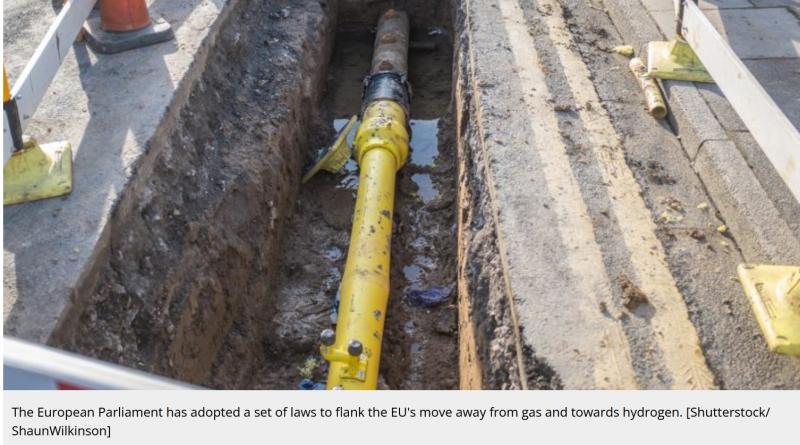Shift to hydrogen networks: EU Parliament adopts laws for new gas era

The European Parliament adopted a new set of laws on Thursday (11 April) to transition Europe’s gas markets and infrastructure to hydrogen and pave the way for the eventual creation of an independent hydrogen grid development body.
In late 2021, the EU kickstarted an overhaul of its gas governance to get the bloc ready for a future where gas is phased out – and hydrogen phased in. A set of new laws will govern whether legacy gas companies can run both businesses at the same time – and who will take charge of planning the grid.
“We are taking yet another step towards the energy transition,” said Jerzy Buzek, erstwhile Polish prime minister and centre-right lawmaker who co-led the negotiations on the twin laws making up the gas package.
“The new regulation will transform the current energy market into one based primarily on two sources – green electricity and green gases,” he stressed.
Fundamentally, the adopted gas package – backed by a broad majority of up to 447 lawmakers with 90 against – gives more legal certainty to would-be hydrogen grid investors, while targeting a better coordination of future network planning.
The law lays “the legal foundations for a European hydrogen market, marking the beginning of the phase-out of natural gas,” said Jens Geier, a German centre-left lawmaker who co-led the negotiations.
The climate advocacy group CAN Europe commented that “the gas package operates with a one-to-one replacement logic i.e. (…) copy-pasting the current gas infrastructure system onto future hydrogen networks”.
From gas to hydrogen networks
Hydrogen network planning will be overseen by the EU entity for Hydrogen Network Operators (ENNOH). This newly-created body will present a ten-year development plan for Europe’s hydrogen infrastructure in 2026 – working in concert with the gas operator body ENTSOG.
Some industry observers argue that this may compromise ENNOH’s independence and muddy the waters when it comes to the move from gas to hydrogen. Operators of gas pipelines who wish to repurpose their equipment to accommodate hydrogen must include it in ENNOH’s ten year plan.
From 2028 ENNOH will operate independently on a follow-up development plan for the hydrogen network.
Geier said the new framework marks a kick-off for a crucial process: the decommissioning of the gas grid, as “the transition from natural gas to hydrogen will make parts of the network redundant”.
Decommissioning the gas grid has proven controversial in the past, and activists lauded the EU rules kickstarting the process.
CAN Europe’s Esther Bollendorf said the package “initiated a positive process to decommission gas grids that won’t be needed in the future”.
Parallel ownership
Given the monopoly position of network operators and their control over market entry, regulators normally aim to protect consumers by imposing restrictions on network ownership.
On hydrogen, the Commission proposed a clear separation of local hydrogen and gas grid operators.
Following pressure from Germany, the Parliament changed this. Instead, municipal utilities that operate gas networks today can add hydrogen grids to their portfolio in the coming years, provided they meet the exemption criteria of having fewer than 100,000 customers.
Barring Russia
At the behest of the Polish lawmaker Buzek, who led negotiations on the file, Europe’s new gas rules will also empower EU countries to unilaterally bar Russian gas imports.
“We have introduced a legal option for EU countries to stop importing gas from Russia if there is a security threat,” he said.
Russian gas continues to make up a large share of imports in several EU countries, while others like Germany saw theirs drop to zero. The new law will give further ammunition to those calling for a complete ban on imports of Russian gas.
[Edited by Donagh Cagney/Zoran Radosavljevic]


